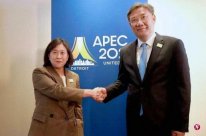Bi Anqi, the US Deputy Trade Representative, told Reuters that the United States has adopted an analytical way to review whether it continues to impose tariffs on Chinese goods, rather than depending on whether it has obtained any breakthroughs in the US -China trade relations.
Sarah Bianchi (May 27) said in an interview with Reuters that the U.S. government will not assume that the US -China trade subject will get a breakthrough, but it will continue to be at all levels.Dialogue.
The US side launched a survey of Article 301 earlier that China stole American intellectual property rights and coerced American companies to transfer sensitive technologies in American companies that wanted to do business locally.Then President Trump subsequently levied tariffs on thousands of Chinese imported goods in 2018 and 2019 to thousands of Chinese imported goods ($ 499.5 billion).
According to Article 301 of the 1974 Trade Law, the United States needs to review after four years of tariffs for the first time.According to reports, Bi Anqi refused to say when the review was completed, but it was reasonable to add to the end of 2023.
The Office of the United States Trade Representative has extended the exemption from the product tariffs from 352 imports at the end of 2022, and expired on September 30.Some trade experts in Washington believe that this date may be the time point for the United States to make a decision when reviewing tariff measures.
The United States was trying to suppress high inflation during the review period, and some US officials also proposed to cancel some tariffs at the time.
On the other hand, the Minister of Commerce of China Wang Wentao met with the US Department of Commerce Raymond Doro and the US trade representative Daiqi.When Dai Qi met with Wang Wentao, he was dissatisfied with the economic policy led by the Chinese government, and Wang Wentao concerned the US economic and trade policy and tariffs on China.Both sides have stated that they should keep communication.



